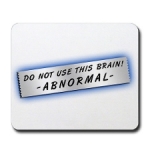I actually consider this topic very On Topic because there seem to be a lot of people who have both OSA and Hypothyroidism... and in my mind there is a very clear link with untreated OSA and the development of thyroid problems.
First I will make the standard Disclaimer (again): I am not a doctor in any way, this is only based on extensive reading and my own personal experience! FWIW & YMMV.SleepingUgly wrote:I was diagnosed with Hashimoto's Thyroiditis a few years ago, and, as determined by my TSH, I remain euthyroid. They don't test anything besides my TSH anymore (although I have some older numbers for T4, T3 Uptake, Free Thyroxine Index, etc.). I get tested every 4-6 months. Examples of some of my last TSH's were 1.49, 1.35, 1.56, 1.89, 2.65, (others in the 2's), 2.99, etc... The highest ever, never to be repeated, was 3.78, and that was more than 2 years ago. All the rest since have been 2's and 1's. Once (or twice?) I had a low PTH, but nothing was made of that in the absence of other abnormalities.
With these very low numbers, is it even possible for hypothyroidism to be an issue? Isn't that more of an issue in the 4's, and higher (and maybe in the 3's), but certainly not the 1's?
There are two separate issues here:
(1) Do you treat Hashimoto's Disease when the lab values all show "normal"
(2) Do you treat someone that has all the symptoms of hypothryoidism when all lab values show "normal"
So,
(1) Now, based on a number of articles I read, it seems that some doctors suggest treating Hashimoto's Thyroiditis even in the absence of non-normal lab values for TSH, T4, T3, because in the long term it prevents/delays the development of hypothyroidism.
"Treating Antibodies When TSH is Normal" : http://thyroid.about.com/od/hypothyroid ... tative.htm
The references are from 2005, I haven't checked any new references but that would be easy enough.
(2) Then there is the issue that your lab values are all within the lab's "normal range" yet you still feel like crud. Everything else checks out ok too (e.g. no diabetes, heart is OK, blood vitamin and mineral levels are OK, etc). Yet you still have many of the symptoms of hypothyroidism (again one must tread with caution since these symptoms can be caused by other things, but in this case the false negative rate in detecting hypothyroidism is probably higher than other health problems, due to the currently used threshold for TSH).
The problem with the "normal" ranges are that the recommended thresholds have changed, yet not all blood labs have changed THEIR ranges.
In January 2003, the American Association of Clinical Endocrinologists (AACE) stated that doctors "consider treatment for patients who test outside the boundaries of a narrower margin based on a target TSH level of 0.3 to 3.0. AACE believes the new range will result in proper diagnosis for millions of Americans who suffer from a mild thyroid disorder, but have gone untreated until now."
Read more at
"The TSH Reference Range Wars: What's "Normal?", Who is Wrong, Who is Right..." : http://thyroid.about.com/od/gettestedan ... stwars.htm
and "Is Your Hypothyroidism UNDERtreated?" : http://thyroid.about.com/cs/hypothyroid ... reated.htm
Most labs have set the thresholds for TSH at 0.5 to 5.0, some are even higher at 6, 7, or even 10. In this case, MANY people who SHOULD probably start getting treatment DO NOT.
---
Then there is the question, if you are being treated, what is the optimal TSH to target? Most doctors try to get it <3, (sounds like AHI, anything <5 is fine!), but in fact the ideal target range for TSH may be 1-2. There is also the controversy of whether to include T3 together with T4 (like Armour thyroid or other sources of T3), rather than only T4 (like levothryoxine).
In my case, it took a long time to get started on the meds because none of the doctors would accept that I had hypothyroidism. I finally found one doc willing to work with me. Then I had the second problem with her, she stopped me a low dose because the TSH was pretty low, but i still had symptoms. On these low doses I *did* feel a lot better than before, but still not 100%. I manually titrated myself to a higher dose, and literally overnight I felt like a new person. I went from needing 10-14 hours to only 7-8 hours. So I am now skeptical about cases where the symptoms match the disease, but the person gets a negative diagnosis because the blood values are "normal". Am still waiting to hear back from last week's test as to whether i have the antibodies... but this is SU's thread so that's for another day.
---
In the case of Hashimoto's Thyroiditis, In My Humble Opinion only, if it was me, and I had the symptoms of hypothyroidism and tested positive for thyroid antibodies, I would want to start on levothyroxine, even if the lab values were "normal" or on the edge of "normal". I agree that the 1's are pretty low and probably do indicate that there's no problem, on the other hand treatment with levo might stop the attack on the thyroid (as those studies seem to indicate). And especially if you have the symptoms, then I personally would want to get started on treatment. Also look at the FT3 and FT4 levels, even when the TSH is average you might be able to detect a trend where the T4, and especially the T3, are in the very low range of "normal".
Here is an interesting, sort of anecdotally written article about how to go about finding the right dose of medications when you have Hashimoto's Thyroiditis, since you apparently cannot depend on the blood labs to determine this: Understanding Thyroid Lab Tests : http://www.thyroid-info.com/articles/woliner.htm .
Comments???

















